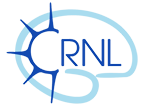Neuroscience and Education
The "Neuroeducation" transverse axis was created to federate the efforts of CRNL researchers interested in using their expertise in neuroscience to improve learning in children and teenagers. Their initiatives range between simple conferences to help teachers better understand physiological and cognitive functions relevant for learning (attention, memory, sleep, the impact of nutrition, ...) to the design of novel classroom interventions and innovative teaching strategies. Some of those interventions are already largely used by teachers throughout the country (especially on sleep and attention, with 10000+ teachers involved).
The transverse axis can be thought of as a "think tank" that will trigger new ideas, identify synergies between disparate projects, transmit information fluidly between participants, minimize competition and maximize cooperation.
The long-term goal is to build a bridge between the local communities of teachers and researchers, each of them being until now a kind of "blackbox" for the other. Practically, our objective is that any teacher in the Lyon area, and beyond, can rapidly identify the local experts in any of the fields mentioned above and know how to work with them hand-in-hand.
Our overall vision is that teachers and researchers should be able to swiftly co-design interventions and innovative practices optimally-suited to the classrooms.
The main operation mode is though meetings to maximize synergies between “Neuroeducation” transverse axis members, which is essential because most neuroeducation projects involve common steps which are dealt with more efficiently at the axis level rather than individually (developing partnership with schools, getting ethical approval, sharing personal ressources common to several projects …).
Scientific interdisciplinarity and communication with educative institutions are intrinsically part of this axis: this is encouraged through the participation of CRNL researchers and members to several local and national networks (‘Association professionnelle des acteurs EdTech’ Lyon, Réseau Thématique Pluridisciplinaire CNRS national ‘RTP’ Éducation, Structure Fédérative de Recherches en Éducation LYon – Saint Etienne ‘RELYS’), as well as strong partnership with major entities within the Education Nationale (Institut National Supérieur du professorat et de l’éducation de l’académie de Lyon, rectorat de Lyon, inspections académiques, publishers such as Réseau Canopé…).
To maximize its local visibility and interaction with academic leaders, the group has organized a one-day workshop which brought together the main regional players from both the academic and the research sides (December 2019, supported by IDEX Lyon).
The transverse axis has already received a warm and positive feedback from the board of the Chancellor of the Academy, with extremely interesting perspectives already (such as a new High-School entirely designed to study the impact of science-based classroom interventions). This domain is also strongly supported by University Lyon 1.
At the scientific level, four subgroups have been identified to work more specifically on (a) general abilities and functions (such as attention, emotion regulation, motivation ...), (b) basic physiological requirements (importance of sleep, nutrition, ...), (c) elementary education (reading, writing, calculus ..), and (d) specific needs (children with specific educational needs).
Each subgroup is actively involved in large-scale innovative projects (I.e. ATOLE for attention education, Memetonpyj for sleep education, Math Mathews Fractions for calculus …) which provide strong practical cases to develop an efficient network of interactions between the CRNL and the world of education.
Our immediate vision is to have full-time staff to provide teachers with a clear view of how CRNL researchers can handle their needs, via training, research projects and organize the synergy.
Jean-Philippe Lachaux (EDUWELL CRNL), jp.lachaux@inserm.fr
Bénédicte Terrier (Cellule Innovation et valorisation & EDUWELL CRNL), benedicte.terrier@inserm.fr











